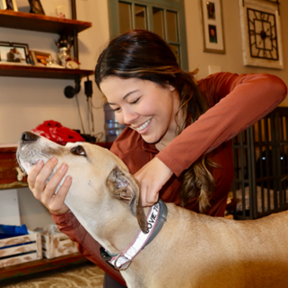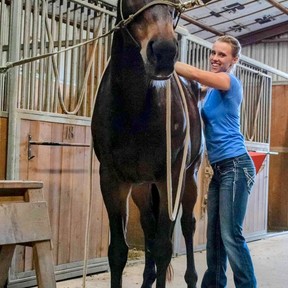nearest to you
-
Jessica Hollis
- ProAnimal Chiropractic - Licensed Animal Chiropractor - Montgomery, OH
-
 INSTANT
CHECKOUT
INSTANT
CHECKOUT
- Montgomery, OH - As an IVCA Certified Animal Chiropractor with over 210 hours of specialized training in animal chiropractic from Options for Animals, I am passionate about enhancing the health...
-
(3 reviews)
-
- Certified
- Book Now
- John Zook
- Board Certified Animal Chiropractor - Springdale, OH
- Springdale, OH - This dedicated pet professional specializes in providing top-tier in-clinic animal chiropractic care and cold laser therapy for dogs and cats. With certifications from the prestigious International Veterinary...
-
-
- Certified
- Request Quote
- David Vargas
- Advanced Healing Center - Animal Chiropractic Care - Fort Wayne, IN
-
 RAPID
RESPONDER
RAPID
RESPONDER
- Fort Wayne, IN - Does you furry friend have an issue that your vet hasn’t been able to help with and you want to avoid drugs and expensive surgery?? We...
-
-
- Licensed
- Certified
- Request Quote
-
Brent McConnell
- McConnell Animal Chiropractic Care - Greenville, PA
-
 INSTANT
CHECKOUT
INSTANT
CHECKOUT
- Greenville, PA - We offer specific, animal chiropractic care. Dr. McConnell is certified by the Animal Veterinary Chiropractic Board. This is the gold standard in Animal Chiropractic Certification. Please refer...
-
(1 review)
-
- Licensed
- Certified
- Insured
- Book Now
- Emily Barber
- Companion Chiropractic - Animal Chiro - Lafayette, IN
- Lafayette, IN - Dr. Emily, is a board certified and licensed human chiropractor with additional animal chiropractic training through Animal Chiropractic Education Source. She operates a mobile chiropractic clinic, parking...
-
-
- Licensed
- Request Quote
- Cody Cox
- Unity Animal Chiropractic - Columbia, KY
- Columbia, KY - Chiropractic evaluation and adjustments. Chiropractic care for animals follows the same principles as in people and has the same benefits which include: decreased pain, improved range of...
-
-
- Certified
- Request Quote
- PetWorks Concierge ❤
- Petworks Concierge - Dog Chiropractor - Chicago, IL
- Chicago, IL - Hello Pet Parents in Chicago! This is the Petworks Concierge Team. Welcome to Petworks. Looking for a dog chiropractor in Chicago? You've come to the perfect place!...
-
-
- Licensed
- Certified
- Insured
- BBB Accredited
- Background Checked
- Online Sessions
- Request Quote
- Dr. Kari Hickey
- Haven Animal Chiropractic - Knoxville, TN
-
 RAPID
RESPONDER
RAPID
RESPONDER
- Knoxville, TN - I’m a chiropractor certified in animal chiropractic by the American Veterinary Chiropractic Association (AVCA). I’m located in Knoxville, TN and primarily help cats and dogs to thrive...
-
-
- Certified
- Request Quote
-
Dr. Rebecca Verna
- Paws for Holistic Pet Care - Animal Chiropractic Care - Marshall, VA
-
 INSTANT
CHECKOUT
INSTANT
CHECKOUT
 RAPID
RESPONDER
RAPID
RESPONDER
- Marshall, VA - With over two years of dedicated service in holistic veterinary care since August 2021, I offer a comprehensive diagnostic and treatment plan tailored to the unique needs...
-
-
- Book Now
- Molly Mehlman
- Dr. Molly Mehlman - AVCA Certified Animal Chiropractor - Spring Grove, IL
- Spring Grove, IL - Dr. Molly is an AVCA certified animal chiropractor located in Spring Grove, IL. She sees dogs and cats out of her office space and does not...
-
-
- Licensed
- Certified
- Insured
- Request Quote
-
Michelle Jobert
- Well Adjusted Pet - Animal Chiropractic Care - Woodstock, IL
-
 INSTANT
CHECKOUT
INSTANT
CHECKOUT
 RAPID
RESPONDER
RAPID
RESPONDER
- Woodstock, IL - I am a veterinarian certified in veterinary acupuncture, chiropractic, Chinese herbal medicine, and food therapy. I also offer cold laser therapy. My practice is focused on holistic...
-
(4 reviews)
-
- Licensed
- Certified
- Bonded
- Insured
- Online Sessions
- Book Now
-
Dr. Julie Adams
- Indian Creek Therapy - Animal Chiropractic Care - Davidson, NC
-
 PETWORKS
PICK
PETWORKS
PICK
 INSTANT
CHECKOUT
INSTANT
CHECKOUT
 RAPID
RESPONDER
RAPID
RESPONDER
- Davidson, NC - Hello animal lovers! My name is Dr. Julie Adams. I am a licensed Chiropractor and certified animal Chiropractor. I have been caring for small and large animals...
-
(3 reviews)
-
- Licensed
- Certified
- Book Now
- PetWorks Concierge ❤
- Petworks Concierge - Dog Chiropractor - Nashville, TN
- Nashville, TN - Welcome to Petworks Concierge! If you're searching for a dog chiropractor in Nashville, Tennessee, you're in the right place! We offer both local and national dog...
-
-
- Licensed
- Certified
- Insured
- BBB Accredited
- Background Checked
- Online Sessions
- Request Quote
- Dr. Roger DeHaan
- Caring Holistic Vet Services and Animal Chiropractic Care - Kings Mountain, NC
- Kings Mountain, NC - Dr. DeHaan is a dedicated veterinarian with an impressive background rooted in agriculture and holistic health. Growing up on an organic vegetable farm and goat dairy,...
-
-
- Online Sessions
- Request Quote
- Dr. Avery Garrabrant
- Dr. Avery Garrabrant - AVCA Certified Animal Chiropractor - Durham, NC
- Durham, NC - Dr. Garrabrant is an American Veterinary Chiropractic Association (AVCA) Certified Animal Chiropractor. She is NOT a veterinarian and her services do not replace traditional veterinary care. Dr....
-
-
- Licensed
- Certified
- Insured
- Request Quote
- Valentina Degiovanni
- Bella Vita Animal Chiropractic Care - Durham, NC
-
 RAPID
RESPONDER
RAPID
RESPONDER
- Durham, NC - At Bella Vita Chiropractic, I am dedicated to providing comprehensive chiropractic care tailored to your beloved pets—whether they are furry companions or gentle giants. As a licensed...
-
-
- Licensed
- Certified
- Request Quote
featured cities
- Dog Chiropractor Albuquerque
- Dog Chiropractor Atlanta
- Dog Chiropractor Austin
- Dog Chiropractor Baltimore
- Dog Chiropractor Boston
- Dog Chiropractor Charlotte
- Dog Chiropractor Chicago
- Dog Chiropractor Cleveland
- Dog Chiropractor Colorado Springs
- Dog Chiropractor Columbus
- Dog Chiropractor Dallas
- Dog Chiropractor Denver
- Dog Chiropractor Detroit
- Dog Chiropractor El Paso
- Dog Chiropractor Fort Worth
- Dog Chiropractor Fresno
- Dog Chiropractor Houston
- Dog Chiropractor Indianapolis
- Dog Chiropractor Jacksonville
- Dog Chiropractor Kansas City
- Dog Chiropractor Las Vegas
- Dog Chiropractor Los Angeles
- Dog Chiropractor Louisville
- Dog Chiropractor Memphis
- Dog Chiropractor Mesa
- Dog Chiropractor Miami
- Dog Chiropractor Milwaukee
- Dog Chiropractor Minneapolis
- Dog Chiropractor Nashville
- Dog Chiropractor New Orleans
- Dog Chiropractor New York City
- Dog Chiropractor Oklahoma City
- Dog Chiropractor Omaha
- Dog Chiropractor Philadelphia
- Dog Chiropractor Phoenix
- Dog Chiropractor Portland
- Dog Chiropractor Raleigh
- Dog Chiropractor Sacramento
- Dog Chiropractor San Antonio
- Dog Chiropractor San Diego
- Dog Chiropractor San Francisco
- Dog Chiropractor San Jose
- Dog Chiropractor Seattle
- Dog Chiropractor Tampa
- Dog Chiropractor Tucson
- Dog Chiropractor Tulsa
- Dog Chiropractor Virginia Beach
- Dog Chiropractor Washington DC
related articles
more info
Certified Dog Chiropractor Services
Help your dog stay healthy, mobile, and comfortable with certified dog chiropractic care. PetWorks connects pet parents with experienced canine chiropractors who specialize in adjustments, pain relief, posture improvement, and overall mobility support. Whether your dog is recovering from an injury, managing arthritis, or simply maintaining peak wellness, our experts provide safe, effective, and personalized care. Schedule a session today and give your dog the professional chiropractic attention they deserve.
🐾 Dog Chiropractor Services – Enhance Mobility, Comfort & Health
At PetWorks, we understand that dogs have unique musculoskeletal needs. Certified dog chiropractors provide gentle, safe, and effective adjustments to improve mobility, relieve pain, and support overall health. Whether your dog is recovering from injury, managing arthritis, improving posture, or enhancing athletic performance, professional canine chiropractic care can make a real difference in their daily comfort and quality of life.
🌟 Expert Insight: Why Canine Chiropractic Care Matters
“Dogs, like humans, can develop joint stiffness, spinal misalignments, and mobility issues as they age or after injuries,” says Dr. Emily Chen, Certified Canine Chiropractor, Los Angeles, CA. “Regular adjustments tailored to each dog’s needs help relieve discomfort, restore natural movement, and prevent long-term issues.”
🐶 Benefits of Dog Chiropractic Care
Increased mobility and range of motion
Relief from pain or stiffness
Support for post-surgical or injury recovery
Improved posture, gait, and athletic performance
Enhanced overall well-being and comfort
🏆 Experienced, Certified Providers
Most PetWorks dog chiropractors have 7 to 25 years of experience helping dogs of all sizes, breeds, and activity levels. They combine hands-on expertise with knowledge of canine anatomy and behavior to provide safe, personalized care. Their familiarity with urban environments, busy streets, and multi-pet households ensures your dog’s session is smooth and stress-free.
💡 How Sessions Work
Dog chiropractic sessions are gentle and non-invasive. Providers assess your dog’s spine, joints, and overall musculoskeletal health, then apply precise adjustments to relieve tension and restore function. Many providers work alongside veterinarians for integrated care, ensuring the best outcomes for your dog’s health.
💰 Average Dog Chiropractor Costs in 2026
The cost of dog chiropractic care varies depending on your dog’s size, needs, and the chiropractor’s experience. In 2026, private sessions typically range from $75 to $150 per session.
Many providers offer multi-session packages for ongoing care, often ranging from $300 to $600 for 4–6 sessions, depending on your dog’s treatment plan.
Factors that can influence pricing include:
Location and travel for in-home appointments
Specialized treatments such as rehabilitation, post-surgery adjustments, or senior dog care
Size and breed of your dog, which can impact session length and complexity
Investing in professional dog chiropractic care can improve mobility, reduce pain, and enhance your dog’s overall quality of life.
❓ Frequently Asked Questions
Q: Are chiropractic sessions safe for all dogs?
A: Yes. Certified dog chiropractors adjust techniques based on your dog’s size, age, and health conditions.
Q: How often should my dog have chiropractic care?
A: Frequency varies depending on your dog’s needs - some dogs benefit from monthly sessions, while others may need occasional check-ins.
Q: Will chiropractic care interfere with veterinary treatment?
A: No. Many chiropractors work in conjunction with veterinarians to complement medical care.
Q: Do providers handle senior or special-needs dogs?
A: Absolutely! Treatment plans are customized for pets of all sizes, ages, and medical requirements.
❤️ Give Your Dog the Care They Deserve
PetWorks connects you with certified, experienced dog chiropractors who provide professional, compassionate care for your dog’s musculoskeletal health. Schedule a session today and help your dog move comfortably, stay active, and enjoy a higher quality of life.
You may also consider booking these pet care services:
Dog Chiropractor by State





















